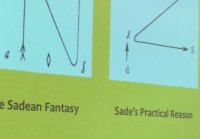Jamieson Webster: Paranoid Encounters – From Masculinity to #MeToo – Paranoia, Hysteria and Other Neurotic Dispositions
On April 4, 2019, Jamieson Webster presented the opening keynote lecture for Paranoid Encounters, a graduate conference organized by The New School Philosophy Department. The conference explores a perspective often disregarded, even rejected by philosophy — that of paranoia — in order to understand and gauge whether philosophy offer anything with respect to the contemporary intellectual and political climate of post-truths, surveillance, xenophobia, and ecological disaster. Special thanks to Pierre Schwarzer for organizing and making the audio available. Click here to listen to audio
Manifesto Fest in DIVISION/Review
A group, including many Unbehagen members, presented a Manifesto Fest at the 2015 Division 39 Spring meeting in San Francisco. Click here to read the manifestos of Will Braun, Jill Gentile, Lynne Layton, Tiffany McLain, Tracy Morgan, Jonathan Shedler, Esther Sperber & Robert Stolorow, published in DIVISION/Review (posted with permission from DIVISION/Review).
A Panel for the Launch of George Makari’s “Soul Machine: The Invention of the Modern Mind”
“Imagine a time in the future when your mind might travel. Perhaps it would enter a different torso or a foreign face. Would you still possess the same self, the same being? Our minds, most of us would agree, define us; they carry our personhood, and where they go, we go too. In Western culture, much depends upon this belief; it underpins a great deal of our literature, art, politics, and jurisprudence. It is the foundation of the commonsense psychology so crucial to social life. The concept of the mind is everywhere, and yet at the same time, it is strangely nowhere. The most powerful arbiter of truth in contemporary life, natural science, refuses to ratify this belief. While our own psyches seem abundantly clear to us, attempts to objectively establish their existence have been mir...Read More
Dany Nobus: Writing as an Instrument of Torture – An Exploration of Sade’s Practical Reason via Lacan’s “Kant with Sade”
Of the twenty-eight substantial papers and six shorter contributions that make up Lacan’s Écrits, “Kant with Sade” is generally regarded as one of the toughest nuts to crack, and this opinion is shared by some of the most eminent and knowledgeable commentators on Lacan’s work. In this seminar, I will unpack one of the crucial lines of Lacan’s argument in “Kant with Sade”, notably that the contents of Sade’s libertine novels, which he also designated as “the Sadean fantasy”, i.e. the fantasy Sade articulated as a literary text within the space of his creative imagination, cannot be mapped directly onto the author’s life. Although it is the ‘sadistic’ fantasy of Sade’s libertine heroes that tends to dominate within the Sadean fantasy—whose full spectrum also includes the more ‘masochistic’ s...Read More
Angelo Villa: Hystericization and Psychoanalytic Belonging
“For belonging does entail an identification; I suggest that the turning point must be made through the difference between a passive identification and an active one. As far as the analysis delves into a familial bond, it allows the patient to return and find a new place in his personal history; a different place from where he had been placed by his symptom, along with those symptoms belonging to others. In other words, the analysis doesn’t break the belonging (how would it be possible?) but it allows the patient to introduce into it his own subjectivity, to have the chance to finally re-write his belonging. This is what needs to happen in an association, too. Belonging to an association should entail the possibility of affecting the life of the association. This is the only way towa...Read More
Gerard Pommier: What Did Feminism and Gender Studies Bring to Psychoanalysis?
In his presentation to Das Unbehagen, Gerard Pommier addressed the challenge of defining the term ‘Woman’: “The uncertainty is such that this difficulty of definition could be used itself as a definition and normative ideal! Judith Butler writes, for instance, that “if a subject unique to feminism remains to be constructed, it would be even more realistic to abandon such a project,” since, she explains, “the category ‘women’ can only reach some stability and coherence within the heterosexual matrix…” Nothing shows this difficulty better than the fragmentation of the feminist movement, or the opposition to feminism by a large number of women. Some theoreticians maintain that gender is a relationship, and not an individual attribute. Others, like Simone de Beauvoir, attest ...Read More
Elissa Marder: Knock Knock: Femininity, Fixation, Photography
“Ultimately, what I am seeking in the photograph taken of me (the ‘intention’ according to which I look at it) is Death: Death is the eidos of that Photograph. Hence, strangely, the only thing that I tolerate, that I like, that is familiar to me, when I am photographed, is the sound of the camera. For me, the Photographer’s organ is not his eye (which terrifies me) but his finger: what is linked to the trigger of the lens, to the metallic shifting of the plates (when the camera still has such things). I love these mechanical sounds in an almost voluptuous way, as if, in the Photograph, they were the very thing -and the only thing -to which my desire clings, their abrupt click breaking through the mortiferous layer of the Pose. For me the noise of Time is not sad: I love bells, clocks...Read More
Cecilia Wu: Reflections on Marcus Coelen’s Philological Psychoanalysis
Here are some notes, reflections and questions on Marcus Coelen, Hannah Wallerstein, and Jamieson Webster’s presentations and the conversations that followed: 1) The Lending of Material, and the Dance of Withholding – Marcus names the 3 compliances or plasticities of materiality of psychoanalysis: contingency, soma, and language. – To consider compliance not as conformity to the mandates of a control room, but as that which lends and is not yet meaningful – To consider the sense of what is put forth without exercising the privileged agency to take it up – To withhold interpretation and suspend judgment (aphexia). To think of this gesture of holding in suspension as a kind of dance that is not ‘horrified with its hands tied behind its back’ – ...Read More
Marc Strauss in Conversation with Das Unbehagen on Psychoanalysis and the Obsessional
If we want to speak of female obsessional neurosis we first have to know what obsessional neurosis is as such. This is not an easy question, because even the most characteristic symptom, such as the ritual or OCD, as it is called nowadays, belongs to the most different personalities. Indeed, what does someone who cries all day in thought of her dead father have in common with a person who cannot leave the house without verifying twenty seven times whether the gas and the taps are turned off? Lacan used the structural model because there is no symptom that would characterize one structure or clinical type. Put differently, the diagnosis is not based on a characteristic detail, since there is no such detail, but on the coherence of the whole that corresponds to the way a speaking being arran...Read More
Evan Malater: UnBadiou – A Seminar on Badiou, the Event, and Unbehagen
Let’s start with Badiou’s description in Ethics regarding what he calls the “truth process.” Remember that the three major dimensions of a truth-process are as follows: the event, which brings to pass ‘something other’ than the situation, opinions, instituted knowledges; the event is a hazardous unpredictable supplement, which vanishes as soon as it appears the fidelity, which is the name of the process: it amounts to a sustained investigation of the situation, under the imperative of the event itself; it is an immanent and continuing break the truth as such, that is, the multiple, internal to the situation, that the fidelity constructs, bit by bit; it is what the fidelity gathers together and produces (Badiou, Ethics: An Essay on the Understanding of Evil, 67-68). Badiou categ...Read More
Simon Critchley: Infinitely Demanding
“It is at this intensely situational, indeed local level that the atomising, expropriating force of neo-liberal globalisation is to be met, contested and resisted. That is, resistance begins by occupying and controlling the terrain upon which one stands, where one lives, works, acts and thinks. This needn’t involve millions of people. It needn’t even involve thousands. It could involve just a few at first. Resistance can be intimate and can begin in small affinity groups. The art of politics consists in weaving such cells of resistance together into a common front, a shared political subjectivity. What is going to allow for the formation of such a political subjectivity – the hegemonic glue, if you will – is an appeal to universality, whether the demand for political repr...Read More





















